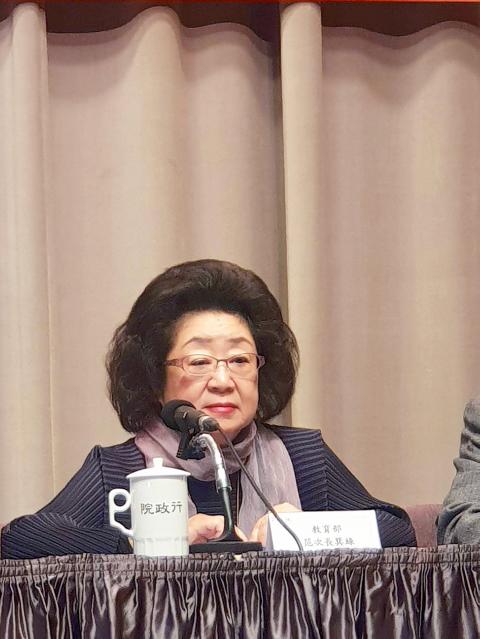The Ministry of Education yesterday proclaimed academic and cultural exchanges by students and teachers with Chinese Communist Party-affiliated institutions a breach of the Act Governing Relations Between the People of the Taiwan Area and the Mainland Area (台灣地區與大陸地區人民關係條例) punishable by a NT$500,000 (US$16,152) fine.
Officials discovered that some schools have become sister schools with Communist Youth League academies, while others have sent interns to China’s state-run China Central Television and the People’s Daily, Department of International and Cross-strait Education Director-General Lai Hsin-jen (賴信任) said.
The ministry has asked the schools to correct the situation and vowed to impose a fine if the infractions persist, Lai said.

Photo: Lee Hsin-fang, Taipei Times
The ministry also plans to meet with the Mainland Affairs Council and schools to discuss China’s “united front” tactics targeting teachers in the areas of culture and education, Deputy Minister of Education Fan Sun-lu (范巽綠) said.
The problem is “very complicated,” Fan told a news conference in Taipei after an Executive Yuan meeting.
The ministry is to meet with the council regularly to discuss the latest developments and actions by China that are “clearly ‘united front’ tactics,” as well as other sensitive topics, she said.
The ministry would try to gain a better understanding of the overall state of exchanges between Chinese and Taiwanese schools, teachers and students, Fan said, adding that it would later discuss the matter with schools.
She said she believes that schools, universities and colleges have the same level of vigilance as the government, and understand that cultural and educational “united front” tactics are not the same as academic exchanges and need to differentiate between the two.
Asked whether Taiwanese teachers would be allowed to accept invitations to visit China on trips whose expenses excluding airfare would be covered by local organizers, Fan said that the matter would need to be discussed with the council, because the government would need to get a grasp on the circumstances of such a visit.
The question was likely a reference to reports that the Zhonghua Cultural Relics Exchange Association and the Shaanxi Province Cultural Relics Exchange Association had asked Taipei-based Sheen Chuen-Chi Cultural and Educational Foundation to co-organize a “Zhonghua history and culture workshop” in China’s Shaanxi and Gansu provinces.
Taiwanese high-school Chinese-language and history teachers were reportedly invited to give lectures and participate in discussions at the workshop, which is to start on July 2 and end on July 9.
The trip would also include visits to tourist attractions, such as the Shaanxi History Museum, anonymous sources said.
Teachers would only need to pay NT$18,000 for the airfare, as well as a NT$5,000 administrative fee, the source said, adding that the Chinese organizers would cover their accommodation, food and transportation expenses.
According to information obtained by the council, Chinese National Cultural Heritage Administration Director Liu Yuzhu (劉玉珠) also serves as the president of the Zhonghua Cultural Relics Exchange Association.
Under such circumstances, it would be inappropriate for Taiwanese teachers to accept an invitation, a national security official said on condition of anonymity.
The ministry should formulate a clear policy and administrative measures to counter such efforts, the official said.

Taiwanese actress Barbie Hsu (徐熙媛) has died of pneumonia at the age of 48 while on a trip to Japan, where she contracted influenza during the Lunar New Year holiday, her sister confirmed today through an agent. "Our whole family came to Japan for a trip, and my dearest and most kindhearted sister Barbie Hsu died of influenza-induced pneumonia and unfortunately left us," Hsu's sister and talk show hostess Dee Hsu (徐熙娣) said. "I was grateful to be her sister in this life and that we got to care for and spend time with each other. I will always be grateful to

UNITED: The premier said Trump’s tariff comments provided a great opportunity for the private and public sectors to come together to maintain the nation’s chip advantage The government is considering ways to assist the nation’s semiconductor industry or hosting collaborative projects with the private sector after US President Donald Trump threatened to impose a 100 percent tariff on chips exported to the US, Premier Cho Jung-tai (卓榮泰) said yesterday. Trump on Monday told Republican members of the US Congress about plans to impose sweeping tariffs on semiconductors, steel, aluminum, copper and pharmaceuticals “in the very near future.” “It’s time for the United States to return to the system that made us richer and more powerful than ever before,” Trump said at the Republican Issues Conference in Miami, Florida. “They

TAIWAN DEFENSE: The initiative would involve integrating various systems in a fast-paced manner through the use of common software to obstruct a Chinese invasion The first tranche of the US Navy’s “Replicator” initiative aimed at obstructing a Chinese invasion of Taiwan would be ready by August, a US Naval Institute (USNI) News report on Tuesday said. The initiative is part of a larger defense strategy for Taiwan, and would involve launching thousands of uncrewed submarines, surface vessels and aerial vehicles around Taiwan to buy the nation and its partners time to assemble a response. The plan was first made public by the Washington Post in June last year, when it cited comments by US Indo-Pacific Commander Admiral Samuel Paparo on the sidelines of the Shangri-La Dialogue

Suspected Chinese spies posing as Taiwanese tourists have been arrested for allegedly taking photographs of Philippine Coast Guard ships, local media reported. The suspected spies stayed at a resort in Palawan, where from a secluded location they used their phones to record coast guard ships entering and leaving a base, Philippine TV network GMA said on Wednesday. Palawan is near the Spratly Islands (Nansha Islands, 南沙群島) and other disputed areas of the South China Sea, where tensions have been on the rise between China and the Philippines. The suspects allegedly also used drones without permission and installed cameras on coconut trees in the